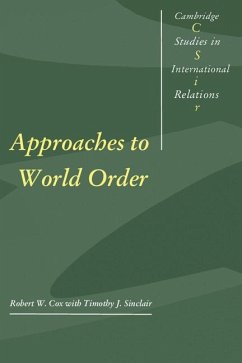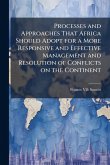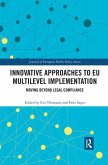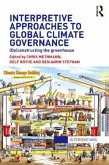Robert W. Cox
Approaches to World Order
Robert W. Cox
Approaches to World Order
- Broschiertes Buch
- Merkliste
- Auf die Merkliste
- Bewerten Bewerten
- Teilen
- Produkt teilen
- Produkterinnerung
- Produkterinnerung
A collection of Robert Cox's most important essays on politics and world order.
Andere Kunden interessierten sich auch für
![Relational, Networked and Collaborative Approaches to Public Diplomacy Relational, Networked and Collaborative Approaches to Public Diplomacy]() Relational, Networked and Collaborative Approaches to Public Diplomacy35,99 €
Relational, Networked and Collaborative Approaches to Public Diplomacy35,99 €![Processes and Approaches That Africa Should Adopt for a More Responsive and Effective Management and Resolution of Conflicts on the Continent Processes and Approaches That Africa Should Adopt for a More Responsive and Effective Management and Resolution of Conflicts on the Continent]() Francis Vib-SanziriProcesses and Approaches That Africa Should Adopt for a More Responsive and Effective Management and Resolution of Conflicts on the Continent17,99 €
Francis Vib-SanziriProcesses and Approaches That Africa Should Adopt for a More Responsive and Effective Management and Resolution of Conflicts on the Continent17,99 €![Religious approaches to Human Rights Religious approaches to Human Rights]() Martin DavieReligious approaches to Human Rights15,99 €
Martin DavieReligious approaches to Human Rights15,99 €![Approaches to Urban Slums Approaches to Urban Slums]() Approaches to Urban Slums28,99 €
Approaches to Urban Slums28,99 €![Innovative Approaches to EU Multilevel Implementation Innovative Approaches to EU Multilevel Implementation]() Innovative Approaches to EU Multilevel Implementation56,99 €
Innovative Approaches to EU Multilevel Implementation56,99 €![European Approaches to International Relations Theory European Approaches to International Relations Theory]() Jörg FriedrichsEuropean Approaches to International Relations Theory59,99 €
Jörg FriedrichsEuropean Approaches to International Relations Theory59,99 €![Interpretive Approaches to Global Climate Governance Interpretive Approaches to Global Climate Governance]() Interpretive Approaches to Global Climate Governance59,99 €
Interpretive Approaches to Global Climate Governance59,99 €-
-
-
Produktdetails
- Produktdetails
- Verlag: Cambridge University Press
- Seitenzahl: 572
- Erscheinungstermin: 19. Oktober 1995
- Englisch
- Abmessung: 229mm x 152mm x 33mm
- Gewicht: 917g
- ISBN-13: 9780521466516
- ISBN-10: 0521466512
- Artikelnr.: 22468711
- Herstellerkennzeichnung
- Libri GmbH
- Europaallee 1
- 36244 Bad Hersfeld
- gpsr@libri.de
- Verlag: Cambridge University Press
- Seitenzahl: 572
- Erscheinungstermin: 19. Oktober 1995
- Englisch
- Abmessung: 229mm x 152mm x 33mm
- Gewicht: 917g
- ISBN-13: 9780521466516
- ISBN-10: 0521466512
- Artikelnr.: 22468711
- Herstellerkennzeichnung
- Libri GmbH
- Europaallee 1
- 36244 Bad Hersfeld
- gpsr@libri.de
Part I. Overviews: 1. Beyond international relations theory: Robert W. Cox and approaches to world order Timothy J. Sinclair
2. Influences and commitments
Part II. Theory: 3. The idea of international labour regulation
4. Realism, positivism
5. On thinking about future world order
6. Social forces, states and world orders
7. Gramsci, hegemony and international relations: an essay in method
8. Towards a post-hegemonic conceptualisation of world-order: reflections on the relevancy of Ibn Khaldun
9. 'Take six eggs': theory, finance, and the real economy in the work of Susan Strange
Part III. Interpretations: 10. The global political economy and social choice
11. 'Real socialism' in historical perspective
12. Structural issues of global governance: implications for Europe
13. Middlepowermanship, Japan, and future world order
14. Production and security
15. Global perestroika
Part IV. Multilateralism: 16. The executive head: an essay on leadership in international organisation
17. Decision making with Harold K. Jacobsen
18. Ideologies and the new international economic order: reflection on some recent literature
19. Labour and hegemony
20. Labour and hegemony: a reply
21. Multilateralism and world order
22. Globalisation, multilateralism and democracy.
2. Influences and commitments
Part II. Theory: 3. The idea of international labour regulation
4. Realism, positivism
5. On thinking about future world order
6. Social forces, states and world orders
7. Gramsci, hegemony and international relations: an essay in method
8. Towards a post-hegemonic conceptualisation of world-order: reflections on the relevancy of Ibn Khaldun
9. 'Take six eggs': theory, finance, and the real economy in the work of Susan Strange
Part III. Interpretations: 10. The global political economy and social choice
11. 'Real socialism' in historical perspective
12. Structural issues of global governance: implications for Europe
13. Middlepowermanship, Japan, and future world order
14. Production and security
15. Global perestroika
Part IV. Multilateralism: 16. The executive head: an essay on leadership in international organisation
17. Decision making with Harold K. Jacobsen
18. Ideologies and the new international economic order: reflection on some recent literature
19. Labour and hegemony
20. Labour and hegemony: a reply
21. Multilateralism and world order
22. Globalisation, multilateralism and democracy.
Part I. Overviews: 1. Beyond international relations theory: Robert W. Cox and approaches to world order Timothy J. Sinclair
2. Influences and commitments
Part II. Theory: 3. The idea of international labour regulation
4. Realism, positivism
5. On thinking about future world order
6. Social forces, states and world orders
7. Gramsci, hegemony and international relations: an essay in method
8. Towards a post-hegemonic conceptualisation of world-order: reflections on the relevancy of Ibn Khaldun
9. 'Take six eggs': theory, finance, and the real economy in the work of Susan Strange
Part III. Interpretations: 10. The global political economy and social choice
11. 'Real socialism' in historical perspective
12. Structural issues of global governance: implications for Europe
13. Middlepowermanship, Japan, and future world order
14. Production and security
15. Global perestroika
Part IV. Multilateralism: 16. The executive head: an essay on leadership in international organisation
17. Decision making with Harold K. Jacobsen
18. Ideologies and the new international economic order: reflection on some recent literature
19. Labour and hegemony
20. Labour and hegemony: a reply
21. Multilateralism and world order
22. Globalisation, multilateralism and democracy.
2. Influences and commitments
Part II. Theory: 3. The idea of international labour regulation
4. Realism, positivism
5. On thinking about future world order
6. Social forces, states and world orders
7. Gramsci, hegemony and international relations: an essay in method
8. Towards a post-hegemonic conceptualisation of world-order: reflections on the relevancy of Ibn Khaldun
9. 'Take six eggs': theory, finance, and the real economy in the work of Susan Strange
Part III. Interpretations: 10. The global political economy and social choice
11. 'Real socialism' in historical perspective
12. Structural issues of global governance: implications for Europe
13. Middlepowermanship, Japan, and future world order
14. Production and security
15. Global perestroika
Part IV. Multilateralism: 16. The executive head: an essay on leadership in international organisation
17. Decision making with Harold K. Jacobsen
18. Ideologies and the new international economic order: reflection on some recent literature
19. Labour and hegemony
20. Labour and hegemony: a reply
21. Multilateralism and world order
22. Globalisation, multilateralism and democracy.









